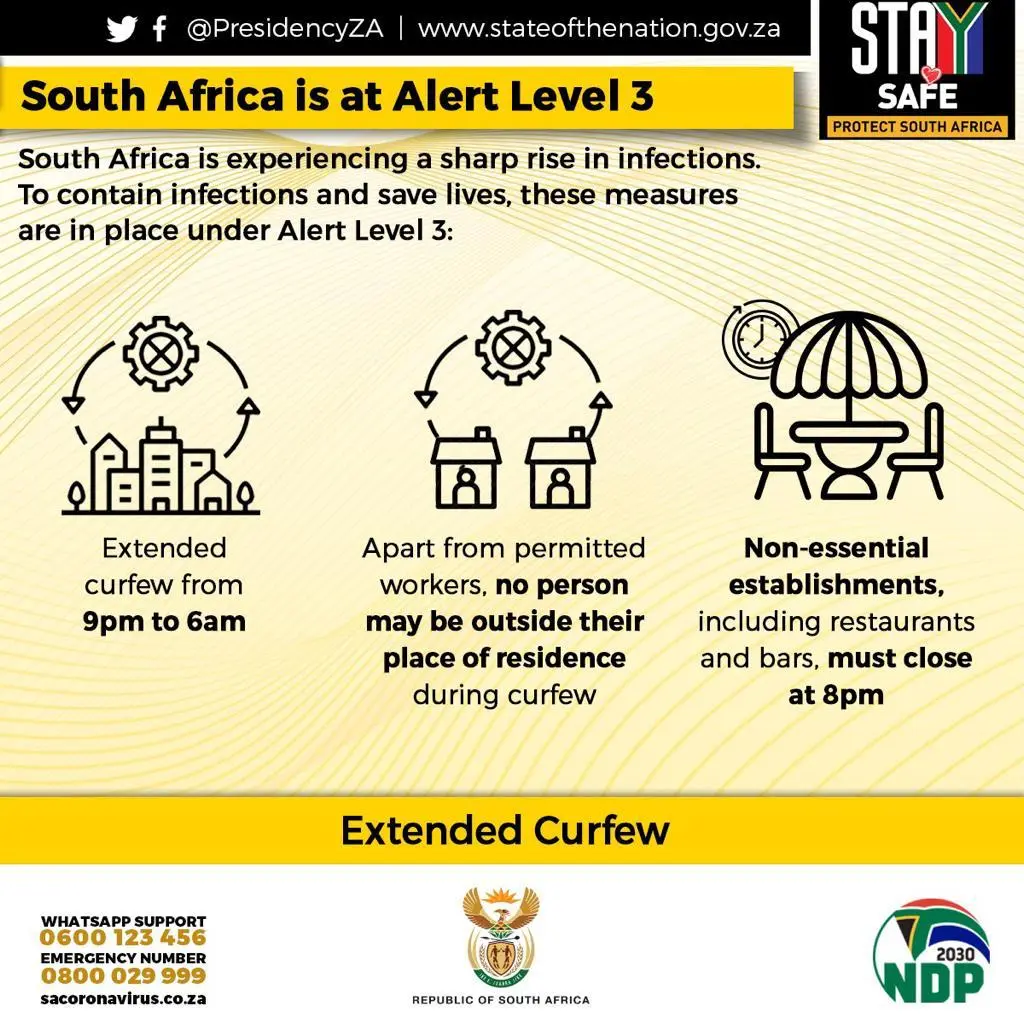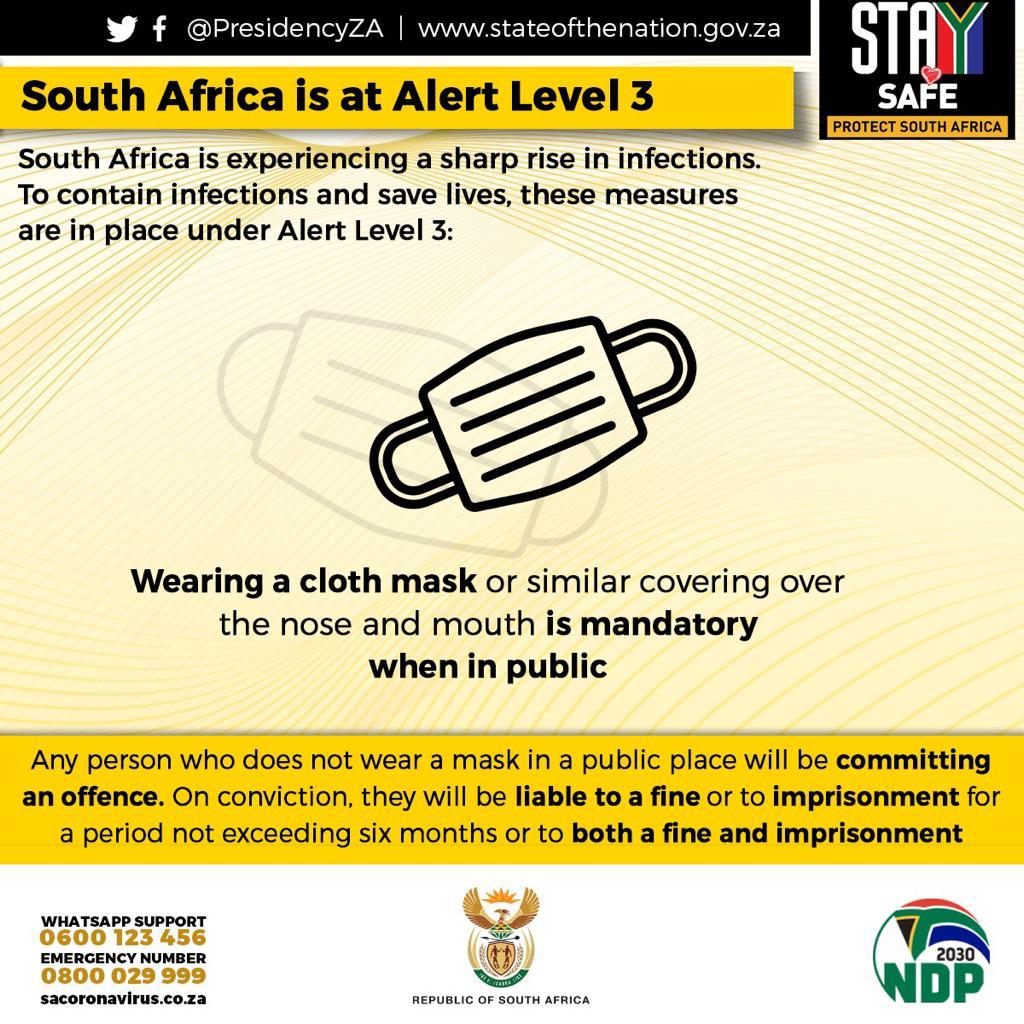Drastic times call for drastic measures.
This was the message from President Cyril Ramaphosa on Monday, as he announced the tightening of lockdown measures aimed at controlling the spread of Covid-19 in South Africa.
“On the recommendation of the National Coronavirus Command Council, and after consultation with provinces and metro mayors, Cabinet has decided to put the country on an adjusted Level 3 from Level 1 with immediate effect,” Ramaphosa said.
The most significant of the new regulations are as follows:
- The nationwide curfew has now been extended from 9pm to 6am;
- Non-essential establishments, including bars and restaurants, must close at 8pm;
- Every individual is now legally responsible for wearing a mask in public, and failure to do so can result in arrest, a fine and up to 6 months’ imprisonment;
- Alcohol may not be sold in shops or consumed in bars and restaurants, nor transported;
- 22 additional hotspot areas have been declared nationally, including central Durban, Johannesburg, Pretoria and Cape Town;
- All beaches, parks and pools in hotspot areas will be closed from Tuesday;
- A maximum of 50 people may attend funerals.
Cogta Minister Nkosazana Dlamini-Zuma, Police Minister Bheki Cele and Health Minister Zweli Mkhize are due to elaborate on the new regulations at a briefing scheduled for 10am on Tuesday.
Ramaphosa said that these regulations have been selected in the hope that the economy can largely be kept open while Covid-19 prevention measures are strengthened. He acknowledged that the ban on alcohol was likely to be controversial, noting the contribution made by the industry to the economy.
But the president said that the consumption of alcohol was not just contributing to risky behaviour but also driving up trauma cases in hospitals.
“Bullet wounds, stabbings and motor vehicle accidents are putting unnecessary strain on our already stretched health facilities,” Ramaphosa said.
“Our priority at this time must be to save lives…Every piece of medical equipment, every hospital bed, every healthcare worker, and every oxygen tank is needed to save lives.”
The president also conceded that the possibility of imprisonment for those found guilty of failing to wear a mask was “drastic”, but he said it was “now necessary to ensure compliance with the most basic of preventative measures”.
While government battles to persuade citizens to change their behaviour, it appears that the prospect of a vaccine being made widely available on South African shores is still months away.
“We can confirm that we have signed off on the agreement with COVAX and the Solidarity Fund has made the initial payment of R283 million to the facility,” said Ramaphosa.
Although he said South Africa is part of the “first group of countries” due to receive vaccines from COVAX, their arrival is only expected in the second quarter of 2021.
“We are also having parallel bilateral discussions with a number of vaccine manufacturers, and will make further announcements once firm agreements are in place,” Ramaphosa said.
The president at points appeared almost on the verge of tears as he begged South Africans to take responsibility for their behaviour over the festive season.
“We are at an extremely dangerous point in our fight against the pandemic,” Ramaphosa said.
One of the concerning factors currently is the number of frontline health workers falling sick with Covid-19: 4,630 since the beginning of December, with over 41 000 infected since the start of the pandemic.
Ramaphosa was addressing the nation a day after South Africa passed the mark of more than one million confirmed Covid-19 cases, with more than 50 000 new cases reported since Christmas Eve.
The new restrictions announced by the president are, however, much stricter than those known to have been recommended by the Covid-19 Ministerial Advisory Committee (MAC) less than a week ago.
A report from the MAC dated 23 December 2020, seen by Daily Maverick, stated that three factors were responsible for the rise in Covid-19 cases across the country: the increased transmissibility of the new coronavirus variant; complacency leading to reduced adherence to prevention measures; and superspreading events.
The MAC recommended that the country be moved to Level 2 restrictions “as soon as possible”. It stipulated, however, that two Level 1 restrictions should remain in place: the national curfew should be maintained at 23h00 and accommodation capacity should be maintained at 100% due to the logistical nightmare of trying to reduce it now.
“At this stage, stricter lockdown measures than Level 2 are not recommended,” the MAC stated.
It suggested that a further assessment be made a fortnight after moving the country to Level 2.
Opposition parties and trade unions, meanwhile, have criticised the government for not acting with greater speed and decisiveness to secure a vaccine, which the DA described as “the only solution, and the only alternative to lockdown”.
In a statement responding to Ramaphosa’s Monday announcement, DA leader John Steenhuisen also slammed authorities for seeking to “simply shut down certain industries without simultaneously announcing a single cent of relief programmes to bridge the economic devastation that this will wreak on the hospitality and restaurant industries”. DM




 South Africans watch a live television broadcast of President Cyril Ramaphosa announcing new restrictions in an attempt to slow the Covid-19 surge across the country in Cape Town, South Africa, 28 December 2020. South Africa?s Covid-19 surge has taken the country to more than one million confirmed cases with the president announcing increased lockdown regulations and stricter measures in a bid to slow down the spread of the new variant of the coronavirus 501.V2 which according to experts is more contagious. EPA-EFE/NIC BOTHMA
South Africans watch a live television broadcast of President Cyril Ramaphosa announcing new restrictions in an attempt to slow the Covid-19 surge across the country in Cape Town, South Africa, 28 December 2020. South Africa?s Covid-19 surge has taken the country to more than one million confirmed cases with the president announcing increased lockdown regulations and stricter measures in a bid to slow down the spread of the new variant of the coronavirus 501.V2 which according to experts is more contagious. EPA-EFE/NIC BOTHMA 



